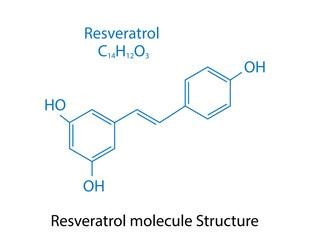HEALTH
What Is Resveratrol And How Does It Benefit Your Body?

Resveratrol-containing products have become common in many supplement stores, and understandably so.
Multiple studies have shown that resveratrol may provide immense therapeutic benefits. The compound is primarily touted for its potential antioxidant properties.
But if you’re encountering this term for the first time, you’re probably wondering what the substance is and whether it delivers on its health claims. Well, this article shall attempt to address those concerns.
Here’s everything you need to know about resveratrol, including its perceived health benefits and common natural sources.
Introducing Resveratrol
Resveratrol is a type of phenol that occurs naturally in numerous plants. It belongs to a specific class of phenols known as stilbenoids.
Most resveratrol-producing plants typically secrete the chemical in response to injury. The compound’s production also peaks during attacks by pathogens, such as fungi and bacteria. It serves as a powerful antioxidant that protects plants from both disease invasion and certain environmental stressors.
Although resveratrol occurs naturally in many plant species, the compound is also available in dietary supplements. There are multiple supplement stores that offer the best trans resveratrol. Some due diligence is all it takes to find the most reputable supplier.
Benefits of Resveratrol
May Guard Against Chronic Diseases
As we’ve just pointed out, resveratrol’s secretion in plants usually peaks in response to pathogens or environmental stresses. That speaks to its potential antioxidant properties.
Like all antioxidants, resveratrol may guard against the onset of chronic illnesses by neutralizing the potential adverse effects of free radicals in the body. The compound particularly prevents oxidative damage to body cells, a phenomenon associated with tissue damage and high disease risks.
May Prolong Lifespan
Chronic ailments are a leading cause of fatalities worldwide. The fact that resveratrol may guard against these diseases implies that it might potentially prolong your lifespan. But that’s not all. Emerging evidence suggests resveratrol may activate certain genes known to fight the diseases of aging. Some findings indicate the compound was able to increase longevity by up to 60% among the studied subjects.
May Suppress Cancerous Cells
Cancer is arguably the most dreaded chronic illness. Fortunately, it’s one of the many diseases that you can prevent or manage effectively using resveratrol supplements.
Animal and test-tube studies have demonstrated resveratrol’s ability to suppress the proliferation of cancerous cells. The substance may also kill cancer cells by changing gene expression in such cells.
Experiments have shown that resveratrol is especially effective against gastric, breast, prostate, colon, and skin cancer.
May Lower Hypertension
High blood pressure (hypertension) is a precursor to heart disease. What makes the condition such a serious problem is that it’s a silent creeper. Without routine medical checkups, most victims will never realize they’re hypertensive until the condition threatens to slip out of hand.
According to a 2015 review, high resveratrol doses might lower hypertension by reducing systolic blood pressure, which is the pressure exerted on arterial walls during heart beats. The compound’s antihypertensive properties were due to its ability to stimulate the production of nitric oxide, a renowned vasodilator.
May Treat Heart Disease
You’ve probably already gathered that resveratrol might help treat heart disease due to its antihypertensive properties.
In fact, many scientists hypothesize that resveratrol is responsible for the lower rates of heart disease among the French population. That’s despite the fact that this very demographic is associated with fat-laden diets, high coffee consumption, and heavy tobacco use, all of which are major risk factors for heart disease.
May Protect the Brain
Resveratrol’s cognitive abilities haven’t been directly investigated. However, several studies associate red wine consumption with delayed onset of age-related cognitive decline.
Since red wine is high in resveratrol, it’s safe to impute most of its cognitive benefits to the compound.
Resveratrol enhances cognitive performance in various ways. Most notably, it blocks the production and signaling of beta-amyloids, proteins involved in the formation of plaques that characterize Alzheimer’s disease.
May Improve Diabetes Symptoms
Animal studies suggest that resveratrol may provide several benefits for diabetes patients. The compound is especially cited for its ability to improve insulin sensitivity. Resveratrol improves insulin sensitivity by inhibiting the conversion of glucose into sorbitol. Sorbitol is a sugar alcohol notorious for inducing oxidative stress. High levels of this alcohol have been observed in diabetics.
Natural Sources of Resveratrol
Resveratrol exists naturally in grapes, berries (including blueberries, mulberries, and raspberries), peanuts, and Japanese knotweed. The compound is concentrated on the skin of fruits, berries, or nuts.
Wine provides the highest resveratrol levels than many natural foods. Red wine is particularly high in the compound because it’s fermented using grape skins much longer than white wine.
In addition to natural sources, resveratrol also comes in dietary supplements. These supplements are typically made from Japanese knotweed.
Delivery Method
Resveratrol supplements are commonly available as pills or powders. You may also find the compound as an oral tincture or in a transdermal patch. It all depends on your preferred delivery method.
Note that resveratrol has lower bioavailability than other common stilbenoids, such as pterostilbene. So, you may need to consume considerably higher dosages to achieve significant therapeutic effects.
Just remember not to overdose on the compound as that may trigger symptoms of gastrointestinal distress, such as vomiting and diarrhea.
Final Word
Resveratrol is a powerful antioxidant that can provide numerous health benefits without triggering any worrying adverse effects. But like most supplements, the conventional wisdom is to start with lower resveratrol doses and work your way up gradually.
Kenneth is a proud native of sydney, born and raised there. However, he pursued his education abroad and studied in Australia. Kenneth has worked as a journalist for almost a decade, making valuable contributions to prominent publications such as Yahoo News and The Verge. Currently, he serves as a journalist for The Hear Up, where he focuses on covering climate and science news. You can reach Kenneth at [email protected].










